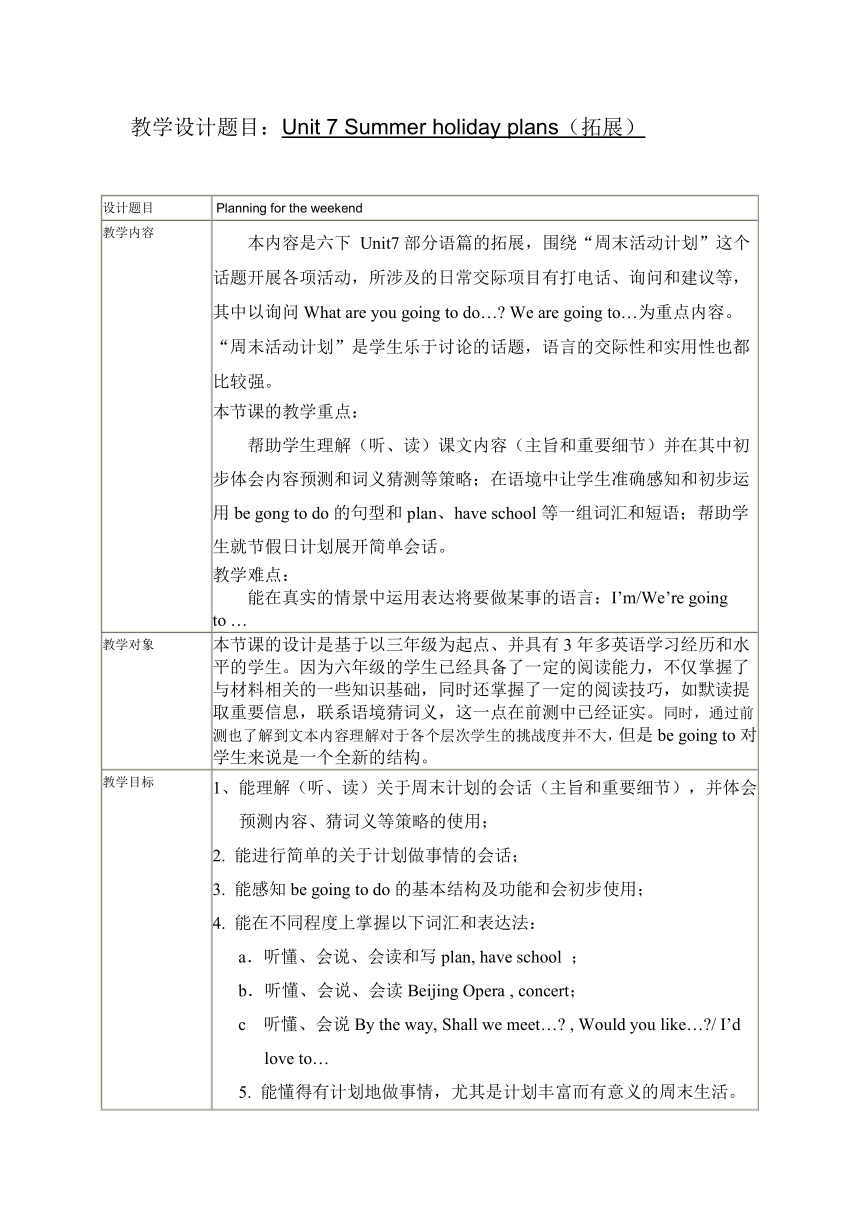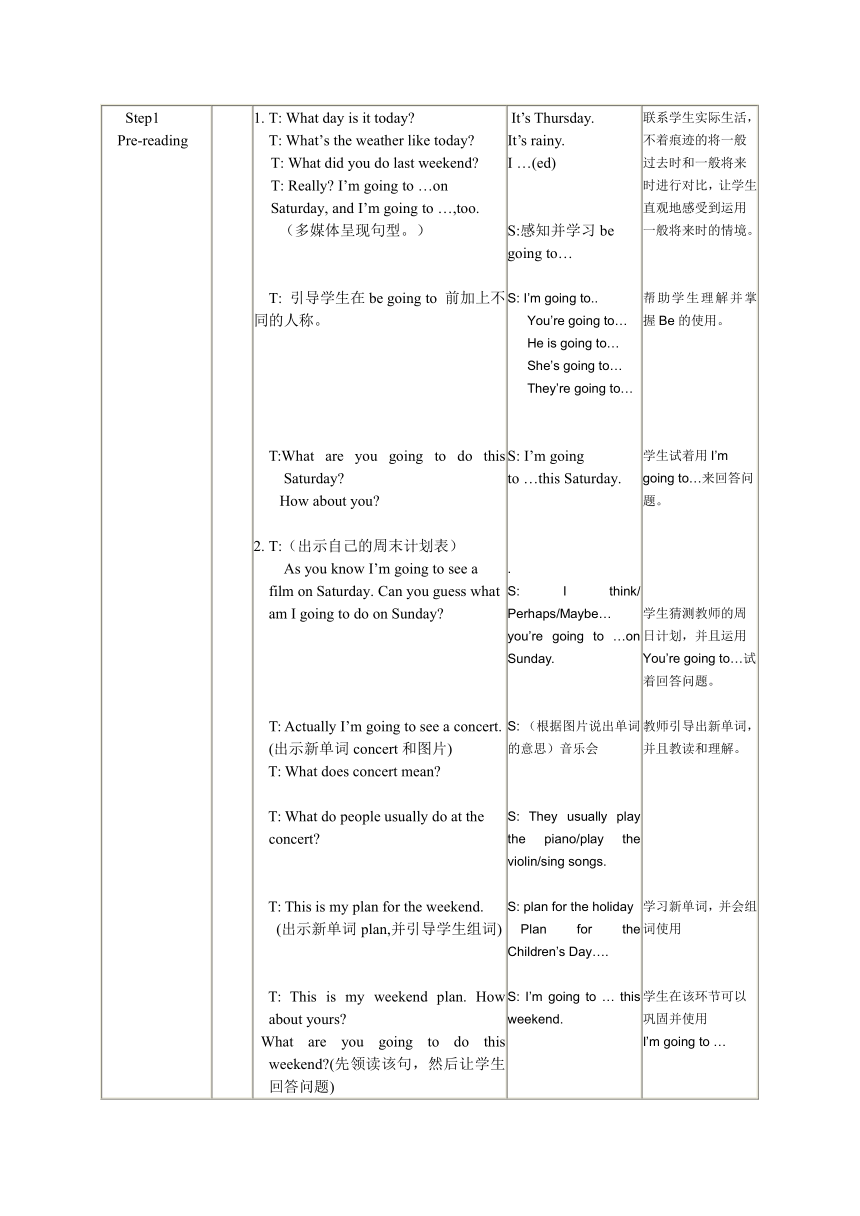Unit7 Summer holiday plans Checkout time 教案(表格式)
文档属性
| 名称 | Unit7 Summer holiday plans Checkout time 教案(表格式) |  | |
| 格式 | doc | ||
| 文件大小 | 89.0KB | ||
| 资源类型 | 教案 | ||
| 版本资源 | 牛津译林版 | ||
| 科目 | 英语 | ||
| 更新时间 | 2022-04-28 20:04:55 | ||
图片预览



文档简介
教学设计题目:Unit 7 Summer holiday plans(拓展)
设计题目 Planning for the weekend
教学内容 本内容是六下 Unit7部分语篇的拓展,围绕“周末活动计划”这个话题开展各项活动,所涉及的日常交际项目有打电话、询问和建议等,其中以询问What are you going to do… We are going to…为重点内容。“周末活动计划”是学生乐于讨论的话题,语言的交际性和实用性也都比较强。 本节课的教学重点: 帮助学生理解(听、读)课文内容(主旨和重要细节)并在其中初步体会内容预测和词义猜测等策略;在语境中让学生准确感知和初步运用be gong to do的句型和plan、have school等一组词汇和短语;帮助学生就节假日计划展开简单会话。教学难点: 能在真实的情景中运用表达将要做某事的语言:I’m/We’re going to …
教学对象 本节课的设计是基于以三年级为起点、并具有3年多英语学习经历和水平的学生。因为六年级的学生已经具备了一定的阅读能力,不仅掌握了与材料相关的一些知识基础,同时还掌握了一定的阅读技巧,如默读提取重要信息,联系语境猜词义,这一点在前测中已经证实。同时,通过前测也了解到文本内容理解对于各个层次学生的挑战度并不大,但是be going to对学生来说是一个全新的结构。
教学目标 1、能理解(听、读)关于周末计划的会话(主旨和重要细节),并体会预测内容、猜词义等策略的使用;2. 能进行简单的关于计划做事情的会话;3. 能感知be going to do的基本结构及功能和会初步使用;4. 能在不同程度上掌握以下词汇和表达法:a.听懂、会说、会读和写plan, have school ;b.听懂、会说、会读Beijing Opera , concert;c 听懂、会说By the way, Shall we meet… , Would you like… / I’d love to…5. 能懂得有计划地做事情,尤其是计划丰富而有意义的周末生活。
Focus of the lesson and predicted area of difficulty教学重难点:1 综合复习本单元的词句,熟练掌握。2 在综合复习的基础上能正确谈论假期计划和出行方式并能完成相应的短文写作。
教学策略 指导学生从全文整体出发,了解语篇的时间及发生的事情。根据语篇的整体性特点,通过开放性问题的设计,通过听、读等方式,逐步掌握语篇细节的内容。利用学生已有的知识储备作为基础,在复习旧知的同时,渗透新的知识。
教学过程(可续页)
教学步骤 所用时间 教 师 活 动 学 生 活 动 设计说明
Step1 Pre-reading 1. T: What day is it today T: What’s the weather like today T: What did you do last weekend T: Really I’m going to …on Saturday, and I’m going to …,too.(多媒体呈现句型。) T: 引导学生在be going to 前加上不同的人称。T:What are you going to do this Saturday How about you 2. T:(出示自己的周末计划表) As you know I’m going to see a film on Saturday. Can you guess what am I going to do on Sunday T: Actually I’m going to see a concert.(出示新单词concert和图片) T: What does concert mean T: What do people usually do at the concert T: This is my plan for the weekend. (出示新单词plan,并引导学生组词) T: This is my weekend plan. How about yours What are you going to do this weekend (先领读该句,然后让学生回答问题) It’s Thursday.It’s rainy.I …(ed)S:感知并学习be going to…S: I’m going to.. You’re going to… He is going to… She’s going to… They’re going to…S: I’m going to …this Saturday..S: I think/ Perhaps/Maybe… you’re going to …on Sunday. S: (根据图片说出单词的意思)音乐会S: They usually play the piano/play the violin/sing songs.S: plan for the holiday Plan for the Children’s Day….S: I’m going to … this weekend. 联系学生实际生活,不着痕迹的将一般过去时和一般将来时进行对比,让学生直观地感受到运用一般将来时的情境。帮助学生理解并掌握Be的使用。学生试着用I’m going to…来回答问题。学生猜测教师的周日计划,并且运用You’re going to…试着回答问题。教师引导出新单词,并且教读和理解。学习新单词,并会组词使用学生在该环节可以巩固并使用I’m going to …
Step2While-readingStep3 After-readingHomework: Task1 T: Just now we talked about our plans for the weekend. Next we are going to talk about this picture.(出示引言图片) Look carefully, what information can you get in the picture T: Do they need to go to school (教师抛出问题,接着让学生听引言,找答案)T: How do you know T: (出示have school)T: The children don’t have school today, Why T: So they’re talking about their plans for the weekend.What are they going to do this weekend T: We also can guess like this.Is Gao Shan going to play basketball Is Wang Bing going to go camping What’s your opinion (引导学生感知并使用一般疑问句)Task2 T:Actually , who is right What are they going to do this weekend Let’s listen to their dialogue.(听课文两遍,并且找出课文主人公周末做的事情,给学生选项进行选择)A: watch a filmB: go to the concertC: play the violinD: see a Beijing operaT: 学生在读题时就可以教opera. Task3 T: (根据学生的反馈,接着提问)Who is going to see a Beijing opera Who is going to play the violin Who is going to go to the concert Let’s try to read the dialogue then find out the detail. Than do the match.T: ( 学生完成后进行校对,并且追问) Where are they going to see a Beijing opera When are they going to see the opera Saturday or Sunday On Sunday, they’re going to go to the concert. Where is it (追问的同时出示课文内容的表格)T: (引导学生根据表格复述课文) From the dialogue, we know on Saturday Gan Shan is going to see a Beijing opera. How about David What about Gao Shan’s friend Task4 T:We know the children’s plan for the weekend. But how do they talk about the weekend How do they invite their friends Let’s find the sentences in the dialogue . Underline them.T: 教师根据学生的反馈板书这些句子,并划出by the way.How do they change the topic T: 带读找出的句子,让学生加深印象。Task5 1.T: Let’s read after the tape, pay attention to the pronunciation and intonation.2. T: Read the dialogue by themselves.T: (brainstorming )Boys and girls, what can you do at the weekend T:There’s an old saying, A good plan is a good start. OK. Let’s make a plan for our weekend.There are the main points of a plan.T:运用所学跟学生对话,给出示范,让学生知道该怎样编对话。T: Please talk about your weekend with your partner.T:Please talk about your weekend plans. with your partners. You may need some of these sentences (PPT):What are you going.. Are you going to By the way. Would you like to join me I’d love to / Shall we meet..听录音,用正确的语音语调朗读本课对话。2. 运用本课对话中学到的新语言,在QQ上用英文和好友设计春游计划 S:学生观察图片,并说出自己看见的。I can see Wang Bing and David.It’s sunny.It’s morning.They’re making a call.S:No, they don’t.S: The children do not have school today.S: Because it is Saturday.S: I think / Perhaps / Maybe Gao Shan is going to…/ David is going to… /They’re going to…S:Is Gao Shan going to… Is David going to… Are they going to… S: Choose B C D(学生反馈出答案)S: 学生根据教师的提问,阅读课文,并完成连线题。 S: They’re going to the Garden Theatre.S: On Saturday.S: In the school.S: David is going to play the violin on Sunday. They’re going to go to the concert.S:学生用不同的线条划出谈论计划的句子和要求朋友的句子S: Gao Shan says by the way.S:学生在教师的指导下标注句子的升降调,重音,连读。S: go to the park See a film Play the piano Have lessons …..S: 至少两组学生进行汇报。 学生看图说话,猜测出引言中的部分内容。听引言,用回答问题的方式去理解have school.教师给出空间,让学生预先猜测文中的主人公周末将要干什么。并且感知和运用一般疑问句。听对话,并找出文中主人公要做的关键事情。从理解文章大意开始入手学习。随课文自然学习新词。从课文大意到课文细节,用问题的形式提示学生找哪些细节,用连线的形式让学生理清课文思路和关键要素。讲连线题变成表格形式,更进一步理清思路,并能让学生更清晰的感知课文内容。根据表格复述课文,进一步熟悉课文大意,并且巩固了be going to句型。学生自己归纳出课文中句子的功能。让学生模仿跟读,培养学生良好的语音语调。联系学生生活实际,将所学语言灵活运用,并能自己制定周末计划邀请朋友一起参加。
设计题目 Planning for the weekend
教学内容 本内容是六下 Unit7部分语篇的拓展,围绕“周末活动计划”这个话题开展各项活动,所涉及的日常交际项目有打电话、询问和建议等,其中以询问What are you going to do… We are going to…为重点内容。“周末活动计划”是学生乐于讨论的话题,语言的交际性和实用性也都比较强。 本节课的教学重点: 帮助学生理解(听、读)课文内容(主旨和重要细节)并在其中初步体会内容预测和词义猜测等策略;在语境中让学生准确感知和初步运用be gong to do的句型和plan、have school等一组词汇和短语;帮助学生就节假日计划展开简单会话。教学难点: 能在真实的情景中运用表达将要做某事的语言:I’m/We’re going to …
教学对象 本节课的设计是基于以三年级为起点、并具有3年多英语学习经历和水平的学生。因为六年级的学生已经具备了一定的阅读能力,不仅掌握了与材料相关的一些知识基础,同时还掌握了一定的阅读技巧,如默读提取重要信息,联系语境猜词义,这一点在前测中已经证实。同时,通过前测也了解到文本内容理解对于各个层次学生的挑战度并不大,但是be going to对学生来说是一个全新的结构。
教学目标 1、能理解(听、读)关于周末计划的会话(主旨和重要细节),并体会预测内容、猜词义等策略的使用;2. 能进行简单的关于计划做事情的会话;3. 能感知be going to do的基本结构及功能和会初步使用;4. 能在不同程度上掌握以下词汇和表达法:a.听懂、会说、会读和写plan, have school ;b.听懂、会说、会读Beijing Opera , concert;c 听懂、会说By the way, Shall we meet… , Would you like… / I’d love to…5. 能懂得有计划地做事情,尤其是计划丰富而有意义的周末生活。
Focus of the lesson and predicted area of difficulty教学重难点:1 综合复习本单元的词句,熟练掌握。2 在综合复习的基础上能正确谈论假期计划和出行方式并能完成相应的短文写作。
教学策略 指导学生从全文整体出发,了解语篇的时间及发生的事情。根据语篇的整体性特点,通过开放性问题的设计,通过听、读等方式,逐步掌握语篇细节的内容。利用学生已有的知识储备作为基础,在复习旧知的同时,渗透新的知识。
教学过程(可续页)
教学步骤 所用时间 教 师 活 动 学 生 活 动 设计说明
Step1 Pre-reading 1. T: What day is it today T: What’s the weather like today T: What did you do last weekend T: Really I’m going to …on Saturday, and I’m going to …,too.(多媒体呈现句型。) T: 引导学生在be going to 前加上不同的人称。T:What are you going to do this Saturday How about you 2. T:(出示自己的周末计划表) As you know I’m going to see a film on Saturday. Can you guess what am I going to do on Sunday T: Actually I’m going to see a concert.(出示新单词concert和图片) T: What does concert mean T: What do people usually do at the concert T: This is my plan for the weekend. (出示新单词plan,并引导学生组词) T: This is my weekend plan. How about yours What are you going to do this weekend (先领读该句,然后让学生回答问题) It’s Thursday.It’s rainy.I …(ed)S:感知并学习be going to…S: I’m going to.. You’re going to… He is going to… She’s going to… They’re going to…S: I’m going to …this Saturday..S: I think/ Perhaps/Maybe… you’re going to …on Sunday. S: (根据图片说出单词的意思)音乐会S: They usually play the piano/play the violin/sing songs.S: plan for the holiday Plan for the Children’s Day….S: I’m going to … this weekend. 联系学生实际生活,不着痕迹的将一般过去时和一般将来时进行对比,让学生直观地感受到运用一般将来时的情境。帮助学生理解并掌握Be的使用。学生试着用I’m going to…来回答问题。学生猜测教师的周日计划,并且运用You’re going to…试着回答问题。教师引导出新单词,并且教读和理解。学习新单词,并会组词使用学生在该环节可以巩固并使用I’m going to …
Step2While-readingStep3 After-readingHomework: Task1 T: Just now we talked about our plans for the weekend. Next we are going to talk about this picture.(出示引言图片) Look carefully, what information can you get in the picture T: Do they need to go to school (教师抛出问题,接着让学生听引言,找答案)T: How do you know T: (出示have school)T: The children don’t have school today, Why T: So they’re talking about their plans for the weekend.What are they going to do this weekend T: We also can guess like this.Is Gao Shan going to play basketball Is Wang Bing going to go camping What’s your opinion (引导学生感知并使用一般疑问句)Task2 T:Actually , who is right What are they going to do this weekend Let’s listen to their dialogue.(听课文两遍,并且找出课文主人公周末做的事情,给学生选项进行选择)A: watch a filmB: go to the concertC: play the violinD: see a Beijing operaT: 学生在读题时就可以教opera. Task3 T: (根据学生的反馈,接着提问)Who is going to see a Beijing opera Who is going to play the violin Who is going to go to the concert Let’s try to read the dialogue then find out the detail. Than do the match.T: ( 学生完成后进行校对,并且追问) Where are they going to see a Beijing opera When are they going to see the opera Saturday or Sunday On Sunday, they’re going to go to the concert. Where is it (追问的同时出示课文内容的表格)T: (引导学生根据表格复述课文) From the dialogue, we know on Saturday Gan Shan is going to see a Beijing opera. How about David What about Gao Shan’s friend Task4 T:We know the children’s plan for the weekend. But how do they talk about the weekend How do they invite their friends Let’s find the sentences in the dialogue . Underline them.T: 教师根据学生的反馈板书这些句子,并划出by the way.How do they change the topic T: 带读找出的句子,让学生加深印象。Task5 1.T: Let’s read after the tape, pay attention to the pronunciation and intonation.2. T: Read the dialogue by themselves.T: (brainstorming )Boys and girls, what can you do at the weekend T:There’s an old saying, A good plan is a good start. OK. Let’s make a plan for our weekend.There are the main points of a plan.T:运用所学跟学生对话,给出示范,让学生知道该怎样编对话。T: Please talk about your weekend with your partner.T:Please talk about your weekend plans. with your partners. You may need some of these sentences (PPT):What are you going.. Are you going to By the way. Would you like to join me I’d love to / Shall we meet..听录音,用正确的语音语调朗读本课对话。2. 运用本课对话中学到的新语言,在QQ上用英文和好友设计春游计划 S:学生观察图片,并说出自己看见的。I can see Wang Bing and David.It’s sunny.It’s morning.They’re making a call.S:No, they don’t.S: The children do not have school today.S: Because it is Saturday.S: I think / Perhaps / Maybe Gao Shan is going to…/ David is going to… /They’re going to…S:Is Gao Shan going to… Is David going to… Are they going to… S: Choose B C D(学生反馈出答案)S: 学生根据教师的提问,阅读课文,并完成连线题。 S: They’re going to the Garden Theatre.S: On Saturday.S: In the school.S: David is going to play the violin on Sunday. They’re going to go to the concert.S:学生用不同的线条划出谈论计划的句子和要求朋友的句子S: Gao Shan says by the way.S:学生在教师的指导下标注句子的升降调,重音,连读。S: go to the park See a film Play the piano Have lessons …..S: 至少两组学生进行汇报。 学生看图说话,猜测出引言中的部分内容。听引言,用回答问题的方式去理解have school.教师给出空间,让学生预先猜测文中的主人公周末将要干什么。并且感知和运用一般疑问句。听对话,并找出文中主人公要做的关键事情。从理解文章大意开始入手学习。随课文自然学习新词。从课文大意到课文细节,用问题的形式提示学生找哪些细节,用连线的形式让学生理清课文思路和关键要素。讲连线题变成表格形式,更进一步理清思路,并能让学生更清晰的感知课文内容。根据表格复述课文,进一步熟悉课文大意,并且巩固了be going to句型。学生自己归纳出课文中句子的功能。让学生模仿跟读,培养学生良好的语音语调。联系学生生活实际,将所学语言灵活运用,并能自己制定周末计划邀请朋友一起参加。
